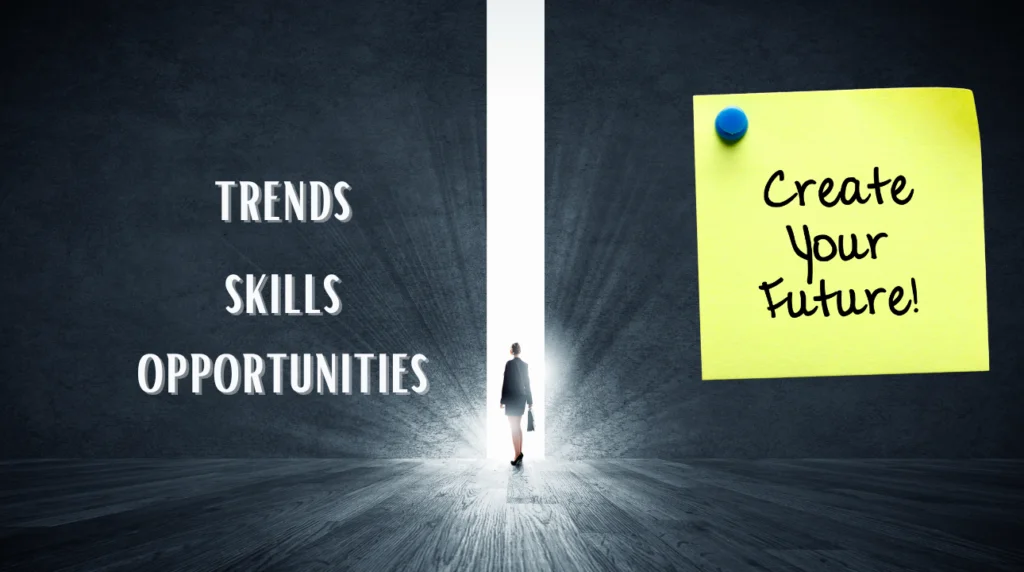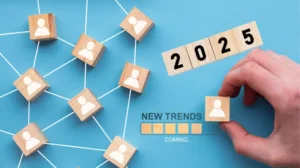The Future of Work: Emerging Trends, Skills, and Opportunities
Published by: Can X Global Solutions Inc.
As we stand at the intersection of technological evolution, shifting work dynamics, and economic challenges, the future of work is a topic of immense curiosity and significance. The way we define jobs, approach skills, and balance technology with human capability is undergoing a radical transformation. While this change brings challenges, it also opens doors for unparalleled opportunities. So, what does the future hold, and how can we prepare ourselves for it? Let’s explore the key trends, skills, and ideas that are shaping the future of work.

The pandemic triggered a fundamental rethink of traditional workplaces. What began as a temporary shift toward remote work has now transformed into a more enduring model hybrid work.
Organizations are moving beyond the simple “remote vs. in office” debate to craft flexible work arrangements that align with employee needs. This means more creative workspaces, fewer rigid schedules, and smarter use of digital collaboration tools. But to make hybrid work successful, companies need to focus on trust and outcome-based performance instead of hours logged. This shift will demand better leadership and clearer communication between teams.
Fresh Insight: In the future, hybrid models may evolve into location agnostic workplaces where employees work seamlessly across time zones. Companies will compete to provide tools, mental health support, and incentives to retain talent seeking flexibility and purpose.
Emerging Perspective: Physical workspaces could transform into purpose driven hubs designed for brainstorming, innovation, and team building rather than routine tasks. Think of futuristic work cafes and smart pods that blend creativity with comfort, enabling employees to reconnect in meaningful ways.
It’s no secret that Artificial Intelligence (AI) and automation are reshaping industries. Jobs that involve repetitive tasks are gradually being automated. However, this isn’t a cause for despair. Instead, it signals a need for human AI collaboration.
Rather than replacing workers, AI will assist them in performing tasks more efficiently. For example:
- Customer service agents will use AI powered tools to address queries faster.
- Healthcare workers will rely on AI diagnostics for quicker and more accurate treatment.
The real value lies in uniquely human skills like emotional intelligence, creativity, and critical thinking traits that machines cannot replicate.
Fresh Insight: The rise of AI will birth new industries, from AI ethics specialists to “explainability” consultants who help interpret complex AI decisions for organizations. Workers who learn to wield these technologies as partners, not replacements, will thrive.
Emerging Perspective: Beyond technical roles, there will be a growing demand for storytellers and creative professionals who can make AI outputs meaningful. For example, generative AI tools may produce content, but human creators will add context, emotional appeal, and strategic direction.
The shelf life of skills is shrinking. What was relevant a decade ago may no longer hold weight in today’s competitive job market. Future ready professionals must embrace a culture of lifelong learning. Employers and educational institutions are shifting focus toward continuous upskilling and micro credentials.
Here are some skills that will dominate the workplace of tomorrow:
- Technical Skills: Data analysis, cloud computing, AI, and cybersecurity.
- Soft Skills: Adaptability, problem solving, and emotional intelligence.
- Leadership Skills: Guiding diverse, global teams with empathy and inclusion.
Fresh Insight: Beyond formal training, peer to peer learning and mentorship will become more important. Platforms that facilitate learning through real world experiences, simulations, and gamification will gain prominence.
Emerging Perspective: Organizations will invest in learning ecosystems with personalized pathways. AI driven platforms will recommend courses, projects, and mentorships tailored to individual strengths and gaps. Employers will partner with universities and ed tech companies to design just in time learning modules.
The gig economy freelancers, contractors, and temporary workers is no longer limited to ride sharing or food delivery. Increasingly, skilled professionals are choosing project-based roles for flexibility and autonomy.
From graphic designers to software engineers, individuals are creating “portfolio careers,” where they juggle multiple projects instead of committing to one employer. This shift will redefine what we perceive as ‘job security.’
For businesses, gig workers provide an agile, cost-effective solution to specific needs. However, they must also offer fair compensation and robust support to retain this dynamic workforce.
Fresh Insight: The next stage of the gig economy will be powered by blockchain based solutions that ensure transparency in payments, contracts, and trust solving many of the current challenges faced by freelancers.
Emerging Perspective: Employers may embrace a hybrid workforce, blending gig workers with full time employees. Gig work platforms will evolve into talent ecosystems, where freelancers can access health insurance, professional development, and financial planning tools.
The mental health and wellbeing of employees are now at the forefront of business strategies. Forward thinking companies are going beyond standard healthcare benefits to offer holistic solutions for mental, emotional, and physical wellness.
Key trends include:
- Paid mental health days
- Programs for mindfulness and stress management
- Access to therapy and counseling platforms
- Opportunities for employees to disconnect and recharge
Companies that prioritize employee well being will not only retain top talent but also unlock higher productivity and creativity in their workforce.
Fresh Insight: Technology might soon merge with wellness, with tools like wearable devices that provide real time health data, helping employers better understand and support individual needs.
Emerging Perspective: Companies will implement innovative policies like four-day work weeks, sabbaticals, and no meeting days to foster a healthier work life balance. Wellbeing will no longer be a perk but a baseline expectation for modern professionals.
We’re entering an era where many future jobs are still undefined. Roles like AI prompt engineers, robotic co workers integrators, and VR experience designers are just the beginning.
To thrive in such a future, individuals must:
- Embrace change and uncertainty.
- Develop meta skills like learning agility, resilience, and systems thinking.
- Collaborate across disciplines and adapt to roles that require diverse skills.
Educational systems will play a critical role in preparing youth for this reality focusing on adaptable skills rather than rigid, specialized knowledge.
Emerging Perspective: New interdisciplinary fields will emerge, blending technology, biology, and ethics. Roles like “cyber psychologists” who explore the emotional impacts of digital interactions will become mainstream.
The future of work isn’t just about new technologies or trends it’s about how we, as individuals and organizations, adapt to change. Companies that focus on empowering their workforce through technology, learning, and wellbeing will lead the way. Similarly, professionals who commit to growth, embrace emerging tools, and prioritize human centric skills will discover limitless opportunities.
Change is inevitable, but it doesn’t need to be overwhelming. By staying curious, adaptable, and forward thinking, we can shape the future of work into one that benefits everyone. The future is not something to fear; it’s something to build together.
Subscribe to Our Blog
Trusted by Businesses Big or Small

























































